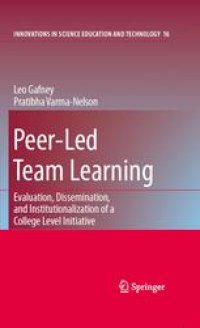
Ebook: Peer-Led Team Learning: Evaluation, Dissemination, and Institutionalization of a College Level Initiative
- Tags: Learning & Instruction, Higher Education, Assessment Testing and Evaluation, Science Education
- Series: Innovations in Science Education and Technology 16
- Year: 2008
- Publisher: Springer Netherlands
- Edition: 1
- Language: English
- pdf
This book is a real-world study of Peer-Led Team Learning (PLTL), a method in which undergraduates work together, under the guidance of a peer leader, in course-connected workshops. PLTL is intended to complement lecture.
The text explains how the method evolved into a teaching/learning model. The evaluation uncovered six critical components for successful implementation. Evaluation at each new site looked at implementation, comparing methods, materials, training, and organizational arrangements with what had been found to work effectively. Those disseminating the model used the critical components to frame their presentations. Dissemination of the method is carefully documented and analyzed.
Evaluation of the program’s effectiveness was shared. Instructors compared grades of classes or cohorts of students with and without PLTL, with different kinds of controls. The external evaluator measured the quality of implementation, student satisfaction, the impact on leaders, and other factors. Finally, this study looks closely at institutionalization: the essential factors necessary for a program’s sustainability. The evaluation explained in this text is transportable to other programs and pedagogies.
"Peer-Led Team Learning (PLTL) is one of the success stories resulting from the National Science Foundation's investment in educational innovation. Gafney and Varma-Nelson provide a coherent, tour-de-force look at the in-depth research that has been carried out, not only to understand the effect of PLTL on student learning, but also to understand the nature of the pedagogical method itself. This monograph is a jam-packed, one-stop destination for anyone who wants to learn what it means to understand a widespread pedagogical development in post-secondary science education."
Brian Coppola, University of Michigan
This book is a real-world study of Peer-Led Team Learning (PLTL), a method in which undergraduates work together, under the guidance of a peer leader, in course-connected workshops. PLTL is intended to complement lecture.
The text explains how the method evolved into a teaching/learning model. The evaluation uncovered six critical components for successful implementation. Evaluation at each new site looked at implementation, comparing methods, materials, training, and organizational arrangements with what had been found to work effectively. Those disseminating the model used the critical components to frame their presentations. Dissemination of the method is carefully documented and analyzed.
Evaluation of the program’s effectiveness was shared. Instructors compared grades of classes or cohorts of students with and without PLTL, with different kinds of controls. The external evaluator measured the quality of implementation, student satisfaction, the impact on leaders, and other factors. Finally, this study looks closely at institutionalization: the essential factors necessary for a program’s sustainability. The evaluation explained in this text is transportable to other programs and pedagogies.
"Peer-Led Team Learning (PLTL) is one of the success stories resulting from the National Science Foundation's investment in educational innovation. Gafney and Varma-Nelson provide a coherent, tour-de-force look at the in-depth research that has been carried out, not only to understand the effect of PLTL on student learning, but also to understand the nature of the pedagogical method itself. This monograph is a jam-packed, one-stop destination for anyone who wants to learn what it means to understand a widespread pedagogical development in post-secondary science education."
Brian Coppola, University of Michigan